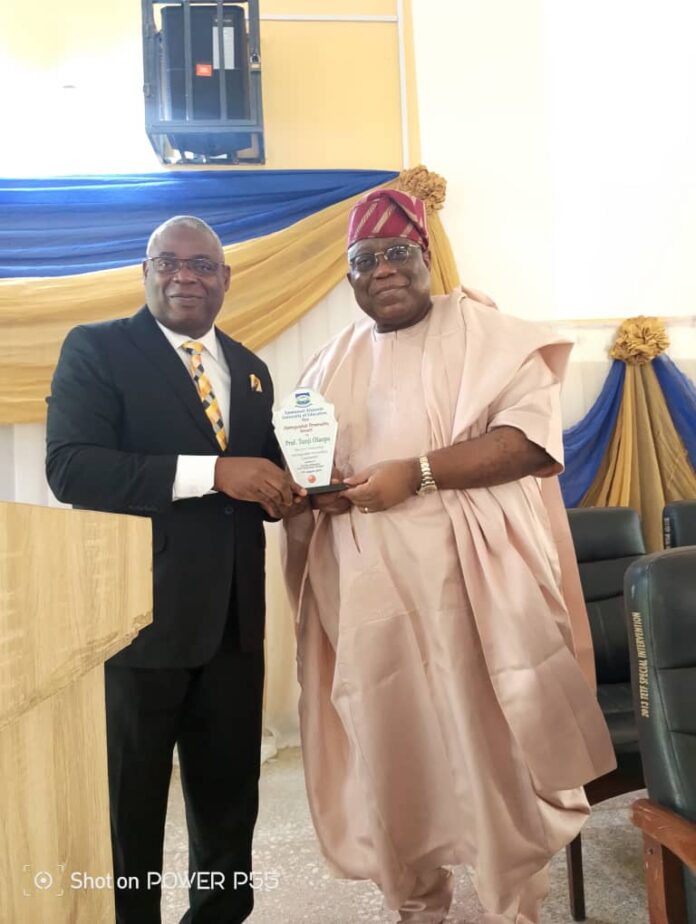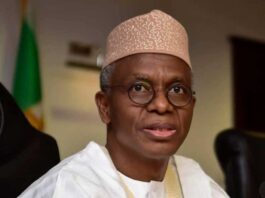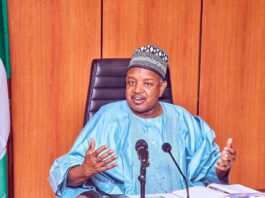Olaopa Seeks Great Tested Managers As VCs, Governing Council Members
CHIGOZIE AMADI
The Chairman of the Federal Civil Service Commission ( FCSC), has urged that only great managers should be made vice chancellors and members of governing councils of universities.
Olaopa made the call on Monday while delivering the 2nd Distinguished Personality Lecture of the Emmanuel Alayande University of Education, Oyo, to mark the 2nd Anniversary of the Vice Chancellor, Prof. Olanrewaju Olaniyan’s Tenure.
The former Federal Permanent Secretary who spoke on the theme “Reforming the Reform of the Education Sector in Nigeria” noted the challenges of transitioning from a college of education to a university, with the need to bring many professors on board.. But he noted that it is in the midst of such challenges that vice chancellors and governing council members thrive. He specifically lauded Prof. Olaniyan’s leadership, noting: ” It is unlikely that this expansion will happen without a measure of disquiet and professional tension. It could also call to institute new standard of assessment and the definition of what constitute scholarly contributions and all that.
“If this and associated issues have been managed seamlessly without culture shocks for any of the parties, then kudos to Prof. Olaniyan and the entire management team.”
Olaopa who referred to what he termed the “Next Level for University Governance and Management” gave an illustration of how great managers shape universities.
He said : “Permit me to put this in context with a story. In 1967, the first Principal and Vice Chancellor at Ibadan, Prof. Kenneth Dike had left for Biafra when the civil war broke out. The Council-Senate Joint Committee drew up criteria for determining the choice of a new VC. Three names emerged namely, Prof. Davidson Nicol, a Sierra Leonian and a former professor of medicine, Chief Simeon Adebo who had then just completed his tenure as Nigeria’s Permanent Representative at the UN in New York, and Prof. T. Adeoye Lambo, the renowned psychiatrist, in that order.
“As it turned out, Prof. Nicol had just about the same time been appointed the Ambassador to the US for Sierra Leone. He therefore declined the appointment as VC. Just as Chief Adebo did as Mr. U Thant, the Secretary General of the UN had written to General Gowon for him to be released to help in starting off the United Nations Institute for Training and Rsearch (UNITAR). This was how Prof. Lambo emerged as VC in 1967.”
According to Olaopa, the point of this historical account is to make the point that today there is the growing trend in high-performing world-class ranking universities appointing proven managers rather than solely academics as university presidents or vice chancellor . He said that this trend which has gained traction globally today, has started playing out even in Nigeria way back as 1967 during the golden era of the public service and the university system in Nigeria.
“The expanding global shift to diversify the sourcing of university administrators beyond the university system and beyond the fold of academics, is driven by increasing complexity of higher education management, and the need for strong leadership for frontier shifting in areas like fundraising, strategic planning, expanding institutional partnerships, deepening of public private partnership and university-industry partnership for more sustainable funding to enable significant administrative and financial autonomy, and overall, institutional development especially in the craving for quality, relevance, internationalization, and global ranking.
Unarguably, public universities in Nigeria face growing financial challenges, requiring CEOs with strong fundraising, financial management skills, leadership to help to navigate a competitive global landscape and long-term planning that require strong strategic thinking and problem-solving skills honed in proven capacity to manage complex projects, building relationships with donors, alumni, industry, development and government agencies, securing resources and supports. It also requires expertise and leadership in building systems, operational efficiency, resource allocation and utilization, process improvement, adapting new technologies, pedagogical approaches, and responding to societal demands, without losing academic focus, neglecting of core academic mission and values, and hindering academic freedom and research-rooted creativity”, he said.
According to him, while these skills and competences can be found in academics as the likes of Prof. Dato Dr. Mazliham Mohd Su’ud and the president/CEO of the Multimedia Univerity (MMU), Prof. Sir Ian Greer, president/VC Queen’s University, Belfast, Prof. Wim de Villiers, VC/Rector at Stellenbosch University, the point being made is that the need to bridge the gap between academic and managerial expertise is becoming critical if there must be growth and transition from the virtual generalists and activism-rooted inertia and the recycling of managerial ignorance that has stagnated higher education administration and progress in Nigeria.
“This of course extends to policy making and the Leading of Change in the Education Sector at the Level of Policy Innovation and National Change Management: Getting the Basics Right.
“This argument also tells us that Nigeria does not lack a rich repertoire of expert-driven knowledge and policy initiatives on how the education system can be reformed.
However, to get the basic rights in reforming the education system, one does not need more and more schematics and modelling and analytics which Nigeria is not lacking. What is needed to connect education design and implementation is a singularly pragmatic and strategic out-of-the-box problem solving managerial acumen”, Olaopa added.








